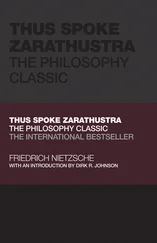In regard to the actual philosophical views expounded in this work, there is an excellent way of clearing up any difficulties they may present, and that is by an appeal to Nietzsche's other works. Again and again, of course, he will be found to express himself so clearly that all reference to his other writings may be dispensed with; but where this is not the case, the advice he himself gives is after all the best to be followed here, viz.:—to regard such works as: "Joyful Science", "Beyond Good and Evil", "The Genealogy of Morals", "The Twilight of the Idols", "The Antichrist", "The Will to Power", etc., etc., as the necessary preparation for "Thus Spake Zarathustra".
These directions, though they are by no means simple to carry out, seem at least to possess the quality of definiteness and straightforwardness. "Follow them and all will be clear," I seem to imply. But I regret to say that this is not really the case. For my experience tells me that even after the above directions have been followed with the greatest possible zeal, the student will still halt in perplexity before certain passages in the book before us, and wonder what they mean. Now, it is with the view of giving a little additional help to all those who find themselves in this position that I proceed to put forth my own personal interpretation of the more abstruse passages in this work.
In offering this little commentary to the Nietzsche student, I should like it to be understood that I make no claim as to its infallibility or indispensability. It represents but an attempt on my part—a very feeble one perhaps—to give the reader what little help I can in surmounting difficulties which a long study of Nietzsche's life and works has enabled me, partially I hope, to overcome.
…
Perhaps it would be as well to start out with a broad and rapid sketch of Nietzsche as a writer on Morals, Evolution, and Sociology, so that the reader may be prepared to pick out for himself, so to speak, all passages in this work bearing in any way upon Nietzsche's views in those three important branches of knowledge.
(A.) Nietzsche and Morality.
In morality, Nietzsche starts out by adopting the position of the relativist. He says there are no absolute values "good" and "evil"; these are mere means adopted by all in order to acquire power to maintain their place in the world, or to become supreme. It is the lion's good to devour an antelope. It is the dead–leaf butterfly's good to tell a foe a falsehood. For when the dead–leaf butterfly is in danger, it clings to the side of a twig, and what it says to its foe is practically this: "I am not a butterfly, I am a dead leaf, and can be of no use to thee." This is a lie which is good to the butterfly, for it preserves it. In nature every species of organic being instinctively adopts and practises those acts which most conduce to the prevalence or supremacy of its kind. Once the most favourable order of conduct is found, proved efficient and established, it becomes the ruling morality of the species that adopts it and bears them along to victory. All species must not and cannot value alike, for what is the lion's good is the antelope's evil and vice versa.
Concepts of good and evil are therefore, in their origin, merely a means to an end, they are expedients for acquiring power.
Applying this principle to mankind, Nietzsche attacked Christian moral values. He declared them to be, like all other morals, merely an expedient for protecting a certain type of man. In the case of Christianity this type was, according to Nietzsche, a low one.
Conflicting moral codes have been no more than the conflicting weapons of different classes of men; for in mankind there is a continual war between the powerful, the noble, the strong, and the well–constituted on the one side, and the impotent, the mean, the weak, and the ill–constituted on the other. The war is a war of moral principles. The morality of the powerful class, Nietzsche calls NOBLE– or MASTER–MORALITY; that of the weak and subordinate class he calls SLAVE–MORALITY. In the first morality it is the eagle which, looking down upon a browsing lamb, contends that "eating lamb is good." In the second, the slave–morality, it is the lamb which, looking up from the sward, bleats dissentingly: "Eating lamb is evil."
(B.) The Master– and Slave–Morality Compared.
The first morality is active, creative, Dionysian. The second is passive, defensive,—to it belongs the "struggle for existence."
Where attempts have not been made to reconcile the two moralities, they may be described as follows:—All is GOOD in the noble morality which proceeds from strength, power, health, well–constitutedness, happiness, and awfulness; for, the motive force behind the people practising it is "the struggle for power." The antithesis "good and bad" to this first class means the same as "noble" and "despicable." "Bad" in the master–morality must be applied to the coward, to all acts that spring from weakness, to the man with "an eye to the main chance," who would forsake everything in order to live.
With the second, the slave–morality, the case is different. There, inasmuch as the community is an oppressed, suffering, unemancipated, and weary one, all THAT will be held to be good which alleviates the state of suffering. Pity, the obliging hand, the warm heart, patience, industry, and humility—these are unquestionably the qualities we shall here find flooded with the light of approval and admiration; because they are the most USEFUL qualities—; they make life endurable, they are of assistance in the "struggle for existence" which is the motive force behind the people practising this morality. To this class, all that is AWFUL is bad, in fact it is THE evil par excellence. Strength, health, superabundance of animal spirits and power, are regarded with hate, suspicion, and fear by the subordinate class.
Now Nietzsche believed that the first or the noble–morality conduced to an ascent in the line of life; because it was creative and active. On the other hand, he believed that the second or slave–morality, where it became paramount, led to degeneration, because it was passive and defensive, wanting merely to keep those who practised it alive. Hence his earnest advocacy of noble–morality.
(C.) Nietzsche and Evolution.
Nietzsche as an evolutionist I shall have occasion to define and discuss in the course of these notes (see Notes on Chapter LVI., par.10, and on Chapter LVII.). For the present let it suffice for us to know that he accepted the "Development Hypothesis" as an explanation of the origin of species: but he did not halt where most naturalists have halted. He by no means regarded man as the highest possible being which evolution could arrive at; for though his physical development may have reached its limit, this is not the case with his mental or spiritual attributes. If the process be a fact; if things have BECOME what they are, then, he contends, we may describe no limit to man's aspirations. If he struggled up from barbarism, and still more remotely from the lower Primates, his ideal should be to surpass man himself and reach Superman (see especially the Prologue).
(D.) Nietzsche and Sociology.
Nietzsche as a sociologist aims at an aristocratic arrangement of society. He would have us rear an ideal race. Honest and truthful in intellectual matters, he could not even think that men are equal. "With these preachers of equality will I not be mixed up and confounded. For thus speaketh justice unto ME: 'Men are not equal.'" He sees precisely in this inequality a purpose to be served, a condition to be exploited. "Every elevation of the type 'man,'" he writes in "Beyond Good and Evil", "has hitherto been the work of an aristocratic society—and so will it always be—a society believing in a long scale of gradations of rank and differences of worth among human beings."
Читать дальше











